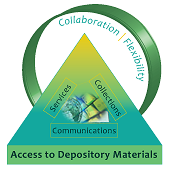|

Libraries must intermittently assess service related to customers, circulation, and information to ensure excellence. As library administrators rethink the role of their library within their institutional settings and how they are going to conduct business in the 21st century, it is not surprising that some directors and depository librarians are questioning the value of being in a Federal depository library.
In all cases, the value of the depository to your users will be an individual depository library assessment.
The trend of Government agencies to publish primarily to the Web provides widespread access to their information like never before. This has resulted in many changes to Federal depository libraries: fewer reference transactions are being reported, remote use of resources is increasing, and fewer tangible materials are being sent in depository shipment boxes.
With a transition in collections and services, what is the future of the Federal Depository Library Program (FDLP)? In the electronic age, how do individual libraries assess the value of being a member of the FDLP?
Find it as Easy as FDL: Free Information, Dedicated Service, Limitless Possibilities
Since 1813, the FDLP has maintained the nation’s first “right-to-know” program. At the foundation are the unwavering principles that the public has the right of access to its government’s information and the Government has an obligation to disseminate and provide broad public access to its information, preserve its information, and guarantee its authenticity and integrity. GPO and the network of depository libraries remain committed to the original intent of the FDLP, to create an informed citizenry who can participate in the democratic processes of the United States.
Keeping Americans Informed uniquely positions Federal depository libraries through law and tradition to provide no-fee public access to current and historical Government information dissemination products.
For example, GPO's cataloging staff provides bibliographic control for all information products published by the U.S. Federal Government including all formats of the products disseminated through the FDLP. GPO is the national (and defacto international) authority for cataloging U.S. Federal publications and participates in the monograph, serial, and authority programs of the Library of Congress, Program for Cooperative Cataloging (PCC). Depositories have the capability to download authoritative cataloging records from GPO’s Catalog of U.S. Government Publications at no cost. With these records in local online catalogs, depositories help the general public identify, locate, and use Federal Government information.
Use it in Smarter Ways: Depository staff helps users in traditional and innovative ways
Depository staff serves users in both traditional and innovative ways. Users of depository resources are provided assistance in not only finding and accessing information, but in better use of authenticated Government information from reliable and trusted sources.
We are Smarter than Me: The FDLP as a catalyst for collaboration
 Comprised of a network of approximately 1,250 Federal depository libraries around the U.S. and its territories, the FDLP is a cooperative partnership with GPO. Depository libraries are of varying sizes and types and provide expert assistance rendered by information professionals. All contribute to the success of the network. Comprised of a network of approximately 1,250 Federal depository libraries around the U.S. and its territories, the FDLP is a cooperative partnership with GPO. Depository libraries are of varying sizes and types and provide expert assistance rendered by information professionals. All contribute to the success of the network.
Depository staff naturally operates in a collegial, collaborative manner to uphold the principles of the FDLP. In turn, GPO and its content and service partners provide free and permanent public access to unique, rich government information resources.
A strong value is placed on the relationships that have developed among and between depositories, library users, GPO, and Federal agencies. With the FDLP serving as a catalyst, depository libraries continue to operate successfully as a network of libraries that support each other regionally and spontaneously form alliances and consortiums to provide value-added services.
Continued collaboration in the FDLP has recently resulted in:
Sharing your story: How do you define the value of the FDLP and your library's participation in it?
With all that GPO provides and the FDLP collaborative effort, the challenge remains for each depository library to identify the value depository designation creates at a local level. What does the FDLP provide to your library, staff, and users? For example:
- Academic libraries may find their depository collection of value for curriculum support, outside research interests, or for accreditation purposes;
- Public libraries might value the peer network that provides onsite instruction for staff, keeping American citizens informed, the free resources to supplement and complement their existing library collections, or assistance in conducting a voter registration drive;
- Law libraries may value the FDLP as a source for official, authentic government materials, or
- Special libraries may find FDLP membership a convenient way to locate unique information resources (medical from NIH, national security from DHS, etc).
Additionally, a value might be placed on an individual library's extraordinary efforts to build expertise, services, and/or collections. Some depositories offer a unique service, employ staff with in-depth expertise in a specific area, or house a rare blend of resources to serve users and the FDLP as a whole. Contributions by any one depository might create a positive value for the entire FDLP.
In August 2008, Ric Davis, the Acting Superintendent of Documents, sent a letter to all depository library directors, asking them to submit letters that describe the value users find in their depository library. The responses that GPO received were unique and thought-provoking and are so important as we embark on the strategic planning process for the FDLP and design our path for the next ten years.
View the collection of depository library director responses.
GPO remains interested in your success stories and anecdotes about the value of your depository to feature on the FDLP Desktop. What are the ways your library derives value from the FDLP? How have your users benefited by using depository resources? Are there additional ways GPO might improve the value of the FDLP in your library? View the recent Letter from Ric Davis, Acting Superintendent of Documents and Director, LSCM.
Compile your stories, news releases, anecdotes, et cetera and share them on the FDLP Community site. Write blogs, start discussions on the forum, share photos, and more!
Welcome to all Oracles and Seers. Bring your Crystal Ball: What will the Future FDLP Look Like?
While you're considering the success of your depository program and the value the depository library brings to your community, consider contributing to the strategic planning project. Are there new services or modified requirements that would increase the value of the FDLP to your depository library, staff and users? GPO is developing a strategic plan for the Federal Depository Library Program (FDLP) that looks forward 10-15 years. Your ideas for designing the future FDLP will ensure a Strategic Plan for the Future of the FDLP is developed that meets the needs of your library, your staff, and your users.
|





 Comprised of a network of approximately 1,250 Federal depository libraries around the U.S. and its territories, the FDLP is a cooperative partnership with GPO. Depository libraries are of varying sizes and types and provide expert assistance rendered by information professionals. All contribute to the success of the network.
Comprised of a network of approximately 1,250 Federal depository libraries around the U.S. and its territories, the FDLP is a cooperative partnership with GPO. Depository libraries are of varying sizes and types and provide expert assistance rendered by information professionals. All contribute to the success of the network.













